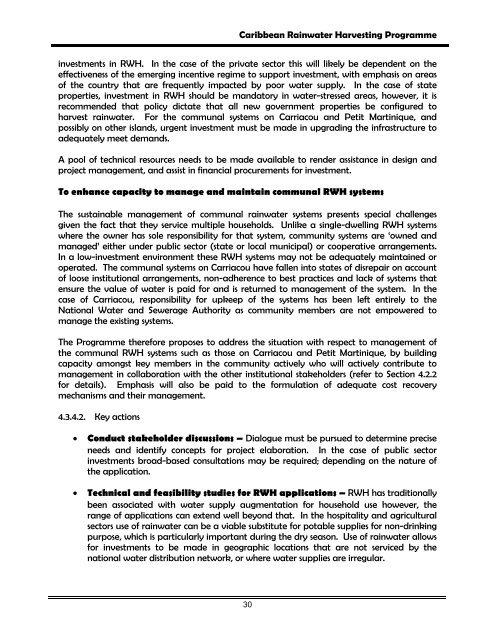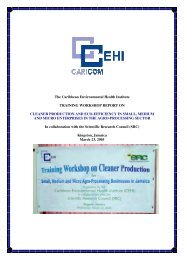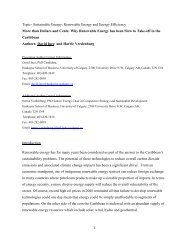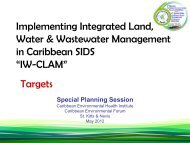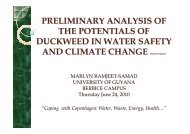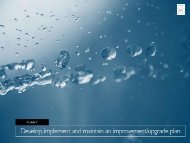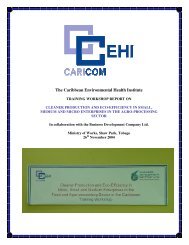A programme for Promoting Rainwater Harvesting in the Caribbean
A programme for Promoting Rainwater Harvesting in the Caribbean
A programme for Promoting Rainwater Harvesting in the Caribbean
You also want an ePaper? Increase the reach of your titles
YUMPU automatically turns print PDFs into web optimized ePapers that Google loves.
<strong>Caribbean</strong> <strong>Ra<strong>in</strong>water</strong> <strong>Harvest<strong>in</strong>g</strong> Programme<strong>in</strong>vestments <strong>in</strong> RWH. In <strong>the</strong> case of <strong>the</strong> private sector this will likely be dependent on <strong>the</strong>effectiveness of <strong>the</strong> emerg<strong>in</strong>g <strong>in</strong>centive regime to support <strong>in</strong>vestment, with emphasis on areasof <strong>the</strong> country that are frequently impacted by poor water supply. In <strong>the</strong> case of stateproperties, <strong>in</strong>vestment <strong>in</strong> RWH should be mandatory <strong>in</strong> water-stressed areas, however, it isrecommended that policy dictate that all new government properties be configured toharvest ra<strong>in</strong>water. For <strong>the</strong> communal systems on Carriacou and Petit Mart<strong>in</strong>ique, andpossibly on o<strong>the</strong>r islands, urgent <strong>in</strong>vestment must be made <strong>in</strong> upgrad<strong>in</strong>g <strong>the</strong> <strong>in</strong>frastructure toadequately meet demands.A pool of technical resources needs to be made available to render assistance <strong>in</strong> design andproject management, and assist <strong>in</strong> f<strong>in</strong>ancial procurements <strong>for</strong> <strong>in</strong>vestment.To enhance capacity to manage and ma<strong>in</strong>ta<strong>in</strong> communal RWH systemsThe susta<strong>in</strong>able management of communal ra<strong>in</strong>water systems presents special challengesgiven <strong>the</strong> fact that <strong>the</strong>y service multiple households. Unlike a s<strong>in</strong>gle-dwell<strong>in</strong>g RWH systemswhere <strong>the</strong> owner has sole responsibility <strong>for</strong> that system, community systems are ‘owned andmanaged’ ei<strong>the</strong>r under public sector (state or local municipal) or cooperative arrangements.In a low-<strong>in</strong>vestment environment <strong>the</strong>se RWH systems may not be adequately ma<strong>in</strong>ta<strong>in</strong>ed oroperated. The communal systems on Carriacou have fallen <strong>in</strong>to states of disrepair on accountof loose <strong>in</strong>stitutional arrangements, non-adherence to best practices and lack of systems thatensure <strong>the</strong> value of water is paid <strong>for</strong> and is returned to management of <strong>the</strong> system. In <strong>the</strong>case of Carriacou, responsibility <strong>for</strong> upkeep of <strong>the</strong> systems has been left entirely to <strong>the</strong>National Water and Sewerage Authority as community members are not empowered tomanage <strong>the</strong> exist<strong>in</strong>g systems.The Programme <strong>the</strong>re<strong>for</strong>e proposes to address <strong>the</strong> situation with respect to management of<strong>the</strong> communal RWH systems such as those on Carriacou and Petit Mart<strong>in</strong>ique, by build<strong>in</strong>gcapacity amongst key members <strong>in</strong> <strong>the</strong> community actively who will actively contribute tomanagement <strong>in</strong> collaboration with <strong>the</strong> o<strong>the</strong>r <strong>in</strong>stitutional stakeholders (refer to Section 4.2.2<strong>for</strong> details). Emphasis will also be paid to <strong>the</strong> <strong>for</strong>mulation of adequate cost recoverymechanisms and <strong>the</strong>ir management.4.3.4.2. Key actions• Conduct stakeholder discussions – Dialogue must be pursued to determ<strong>in</strong>e preciseneeds and identify concepts <strong>for</strong> project elaboration. In <strong>the</strong> case of public sector<strong>in</strong>vestments broad-based consultations may be required; depend<strong>in</strong>g on <strong>the</strong> nature of<strong>the</strong> application.• Technical and feasibility studies <strong>for</strong> RWH applications – RWH has traditionallybeen associated with water supply augmentation <strong>for</strong> household use however, <strong>the</strong>range of applications can extend well beyond that. In <strong>the</strong> hospitality and agriculturalsectors use of ra<strong>in</strong>water can be a viable substitute <strong>for</strong> potable supplies <strong>for</strong> non-dr<strong>in</strong>k<strong>in</strong>gpurpose, which is particularly important dur<strong>in</strong>g <strong>the</strong> dry season. Use of ra<strong>in</strong>water allows<strong>for</strong> <strong>in</strong>vestments to be made <strong>in</strong> geographic locations that are not serviced by <strong>the</strong>national water distribution network, or where water supplies are irregular.30


